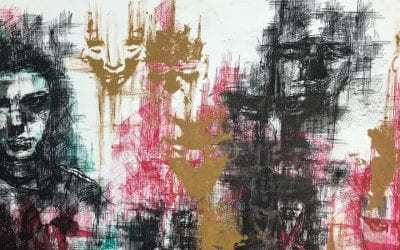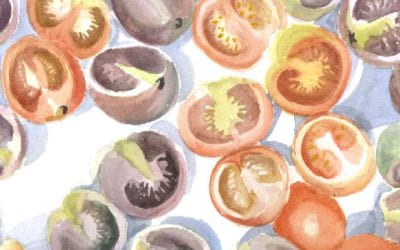Nonfiction by Emma Carter
The ocean is lapping at the sand just in front of me, reaching for my chair. My father, beside me, is mindlessly fidgeting with his beer, playing with the loose string from the seam of his old Clemson koozie.
“I don’t really know how much time is left,” my father says softly, looking at the sea. I feel the threatening sting of tears—a different sort of sea, I suppose, a personal one that seems no less vast. I say nothing in response. Instead, I sit in silence, feeling swallowed.
Next to us, a child is flying a kite with his father. The child is probably no older than four, and he is chasing the shadow of the kite his father is pulling. The kite itself moves fluidly: pulled one way by the wind, and the other by the hands holding it.
“I guess it’s good that he was able to come to the beach. Even if he has to go home early, at least he came for a day or two,” my father says.
“Yeah,” I think about my grandfather’s fragile frame resting in the big yellow chair in the living room, the change in his gait from last year to this year, the way he seems to have become a pile of bones. The new tiredness. Later, I will look at pictures of us from when I was a child and notice the fullness of his calves, the thick white wisps of his hair, his straight posture.
“It’s hard for your mother,” He takes a sip of his beer. The kite in front of us seems to be on its way down—just as I notice it, it crashes into the sand. We are all God’s kites, I want to say to my father. We are all God’s kites, and God determines when we will crash. I say nothing—instead, I watch the child pick the kite up out of the sand and run it back to his father.
“Hard for us all, of course,” he says.
“Do you think that he knows?” I ask.
My father turns to look at me. “Knows what? Knows he’s dying?”
“Yeah,” I shrug.
“I don’t know,” he responds slowly. “I think that somehow he does.”
I turn to look at the waves again. “I guess so,” I say after a moment. “I feel so anxious about talking to him, about saying the wrong thing. Especially with not knowing how much longer there is.”
“Oh, honey,” he says.
The ocean is gentle tonight. The waves are small and there isn’t a lot of seafoam. Seagulls are flying above us and sandpipers are running from the surf, and I feel incredibly small and even more helpless. Next to us, the child has run into a tidepool and is splashing around, laughing loudly. I can’t help but feel a flash of jealousy—I wish I were four, I wish I were chasing a kite around and playing in the tide pool, I wish I was getting ready to waddle back up the beach with my fat little hand held tightly by my mother, I wish I was about to have supper at a big long table with my brothers and my cousins, my aunts and my uncles, my mom and my dad, and my grandparents. I wish I didn’t feel like this. I wish I didn’t have to walk back up the beach just in front of my father. I wish I wasn’t about to go into a rental house that already felt hollow. I wish I wasn’t going to go sit at a table missing my aunt and my uncle, missing my grandparents, missing something warm that we brought with us each year but this one.
My face is getting hot and red, I can tell. The tears I managed to swallow earlier are threatening to spill down my stupid cheeks, off my stupid chin, and into my stupid hands. My father looks out onto the ocean, pretending not to see me. In some ways, I am thankful that he’s giving me a moment of private weakness.
The child and father next to us have pulled the kite into the sky again. It’s hanging gently in the sky—it’s not pulling one way or the other anymore. The father hands the spool to his son, gently guiding him with a hand on his back. The child has noticeably less control over the kite, but his fidgeting and restlessness are balanced out by the sudden calm of the wind.
“Honey,” my father’s voice reaches back out to me, cutting through the thick haze of memory. “There is no right thing.”
I turn to look at him. I look at my same hazel eyes, my same curved nose. I can’t tell if I see my hurt in him. “How can you know that? How do you know that there aren’t things left to say?”
He turns away from me.
***
A week from today, my father will call me at school around 11 p.m. to tell me that it’s over. I will cry, and then I will remember what my grandfather told me about finding moments of laughter, always. I will tell my roommate funny stories, and then I will drive to his old church and find that the sanctuary lights are on, close to 1 a.m. When I am back home the following weekend, my mother will scold me for going out so late in a car so unreliable as mine, but my grandmother will smile quietly and hold my hand.


